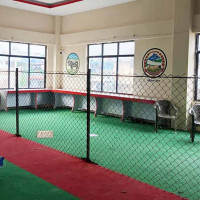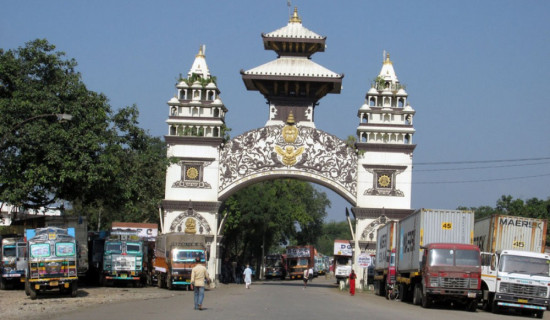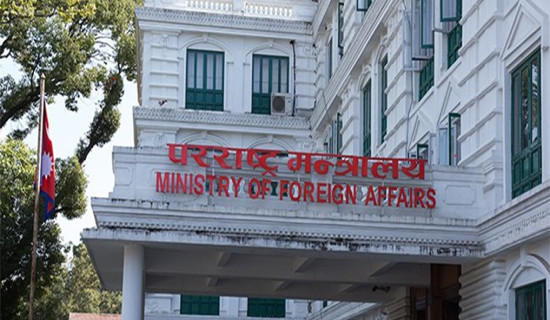- Wednesday, 4 March 2026
Recipe For University Reform
Universities, as hubs of higher learning, play a transformative role in shaping society by creating knowledge, spreading ideas and developing skills. In a liberal economy, they have been embracing corporate-style efficiency in planning, governance, funding, academics, student access, equity, and global outreach. But this remains a challenge for universities in developing countries like Nepal.
Nepali universities suffer from weak governance, low academic quality, and growing migration of students for higher education, straining national finances. Based on the information of the Ministry of Education, Science and Technology and Nepal Rastra Bank, 112,968 students got No Objection Certificate (NOC) for foreign study in the year 2023-24, causing an outflow of 125.13 billion rupees for higher education abroad. This situation calls for a comprehensive reform plan -- not just for the survival of universities, but for national economic growth through quality enhancement of the knowledge industry.
Policy intervention
Higher education reform must target five key areas: academic, administrative, financial, structural, and social. First, the university reform must begin with recruiting cultivated, enviable professors having integrity and a fondness for seeing their university as a hub of scholarship, and ensuring their dignity and fair pay. Current recruitment and promotion policies, salaries and facility provisions fail to attract the bright scholars, and they need immediate policy intervention. Curriculum must be revised regularly by academics with autonomy, guided by teaching and learning freedom. Professional councils and commissions should be kept at a distance to set standard parameters, without coming in the way of the university.
Similarly, Nepali universities must adopt inquiry-driven, interactive, and innovative pedagogy to engage learners meaningfully. Lecture-heavy, rote-learning models focusing more on information dissemination and reproduction of knowledge, devoid of analytical and reflective inquiry, cannot hold in the age of artificial intelligence (AI). Universities must maintain reliable academic calendars regardless of politics. Chaotic university calendar is one of the major reasons why Nepali students leave the country for education abroad. Formative, professor-led assessment should replace outdated exam systems.
High level of integrity, however, will be required on the part of the professor for this task. Admission must prioritise merit to build a serious learning environment. Further, higher education should be considered a right for deserving students to ensure a critical mass of learners, not an entitlement for all. For this, admission must prioritise merit to build a serious learning environment. Degree recognition, credit transfer facilities, tight provisions for internal and independent review for quality assurance and accreditation would reduce student flight. Success requires integrity from faculty and readiness from students.
Whether our professors will have integrity in research, teaching and evaluation, and our students the readiness to comply with the decisions of the professor, is something on which the upward movement of higher education will depend. Second, leading global universities have thrived in an autonomous environment without much regulatory intervention from the government’s policy-making bodies. Nepal must reduce bureaucracy and ensure internal and independent quality checks. Layered regulation only weakens institutions. Derridean concept of university as a ‘domain without condition’ means this ‘freedom to learn’ and ‘freedom to teach’ with light but tight policy parameters.
Universities have to be allowed to function independently without much bureaucratic, political and policy hassles, yet tightly ensuring internal and independent quality assurance and accreditation through reliable mechanisms. Excessive regulations that Nepali higher education policy makers are impatient to create will only invite the end of the glory of educational institutions and their quality. Stable policy frameworks, legal provisions and national higher education strategies set in consonance with global benchmarks only will enable long-term improvement.
Third, without proper infrastructures, libraries, laboratories, and a supportive environment for research, universities cannot ensure quality education and without quality education, students cannot be motivated. Underpaid staff seek side jobs, undermining education and eroding higher education’s purpose. It is, therefore, imperative for universities and the government to rethink funding and income-generating modalities. The government’s funding to the university does not have to be an excuse to control the universities from raising reasonable fees from the students.
Going beyond the government’s funding from revenues, the university too has to diversify its revenue earnings from domestic and foreign students, from private and public philanthropy, endowments, investments, and resource utilisation. The diversification of funding will ensure a student support system in terms of scholarships and long-term loans to carry out their study and help the university to support its faculty and staff in multiple ways, leading to job satisfaction.
Fourth, political interference, student, faculty and staff unionism and syndicates block progress. Geopolitics affects pedagogy and priorities; Nepal must develop its own relevant models. Nepali higher education has been largely influenced by these factors. Until higher educational institutions are under the threat of powerful political actors, students less interested in education and more in politics, teachers and administrators creating syndicates, a transformative agenda will appear to be bleak. The impacts of geopolitics on curriculum, pedagogy, educational models and administration cannot easily be overcome.
Whether we follow the interdisciplinary model, liberal arts model or give STEM focus depends on global, regional and local influence and we need to seriously work to think over. Questions of indigenous knowledge creation and the use of our lingua franca in place of the English language in higher education are of paramount importance.
Organisational culture
Finally, we have to think of the organisational culture and our readiness for reforming higher education. Edgar Shein and Peter Shein focus on visual artifacts, values and assumptions necessary for organisational culture. We have not paid attention to the basics of organisation building and done great harm by creating under-resourced universities without enduring systems in policy matters, impressive physical infrastructures, and academic support systems.
With no goals and assumptions, we have remained wayward. Light, clear, unambiguous and liberating legal provisions only give favourable results. Now is the time to discard legal rigidity and adopt clear, enabling policies that help public and private academic institutions thrive. Can we begin to grant full academic autonomy and commit to broad reforms?
(Joshi is a professor of English, Tribhuvan University and a former Vice Chancellor of Far Western University.)

















